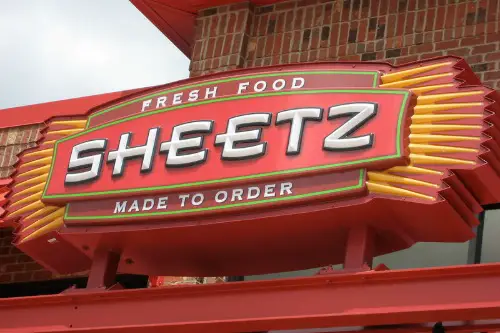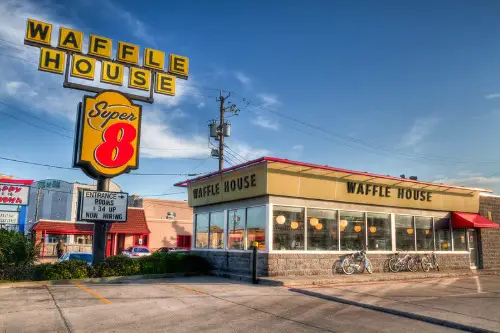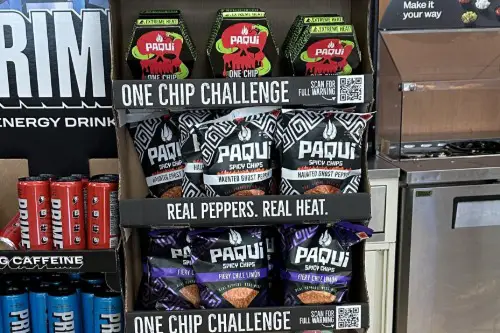1. Wawa

Wawa is iconic in the Mid-Atlantic, known for its hoagies, coffee, and convenience store culture. Despite its loyal following, Wawa has resisted creating a fully online shopping experience. They focus heavily on the in-store experience, believing the smell of fresh food and the personalized service can’t be replicated digitally. Their mobile app exists for ordering, but it’s more about convenience than full e-commerce.
Fans argue that this approach preserves the charm and authenticity of Wawa. You can’t buy a Wawa hoagie from a website, and that exclusivity keeps people coming back. They’ve built a community around in-person visits rather than clicks. For Wawa, the store itself is the brand, and it’s part of the fun.
2. Sheetz

Sheetz, primarily in Pennsylvania and surrounding states, is another gas station chain with a cult following. Like Wawa, they focus on the in-person experience, offering made-to-order food and drinks. While they have a mobile ordering app, you won’t find a full online marketplace. Their model thrives on customization, which is difficult to replicate online.
People love Sheetz for the interaction at the counter and the “create-your-own” menu options. The tactile experience of seeing your food prepared is part of the appeal. Going fully online could dilute the brand’s hands-on vibe. It seems Sheetz prefers being a destination, not just a delivery option.
3. Casey’s General Store

Casey’s is spread across the Midwest and famous for its pizza and friendly small-town vibe. Despite their popularity, Casey’s hasn’t fully embraced e-commerce beyond a basic app for ordering pizza. Their stores double as community hubs, making online shopping feel like it would miss the point. The brand leans on loyalty programs and local presence rather than web sales.
Casey’s fans enjoy the familiarity and personal touch of each location. They often know employees by name and trust the quality that comes from a physical presence. Pizza is only part of the story; it’s the atmosphere that keeps people loyal. Casey’s has made a conscious choice to stay grounded in real-world interactions.
4. QuikTrip

QuikTrip, or QT, is a Southern and Midwestern favorite, known for its clean stores and fast service. They have a strong mobile presence for rewards, but they don’t sell their food or merchandise online. QT seems to value efficiency and immediacy in physical locations more than expanding into e-commerce. The focus is on quick, convenient service rather than digital transactions.
Many fans appreciate that QuikTrip doesn’t overcomplicate things online. Their model is built for stopping in and grabbing what you need. Going online could slow down the quick-turnaround service they’re famous for. QT maintains its reputation by being a reliable, in-person experience.
5. Buc-ee’s

Buc-ee’s is a Texas legend with massive stores and an almost cult-like following. They have merchandise and snacks unique to the brand but very little online presence. Their focus is on making the store a destination, complete with themed souvenirs and a one-of-a-kind atmosphere. For Buc-ee’s, online shopping might cheapen the experience.
Visitors often plan road trips just to see a Buc-ee’s. The giant stores, clean bathrooms, and beaver mascot are part of a physical adventure you can’t get digitally. Their snacks and branded items are best experienced in-store. The sense of discovery is central to the brand.
6. Love’s Travel Stops

Love’s caters primarily to truckers and long-distance travelers. While they have a loyalty app, they don’t sell products directly online. Their strategy emphasizes convenience at the pump and amenities like showers, food, and parking for big rigs. These services can’t easily translate to an online format.
Drivers rely on Love’s physical locations for planning routes and pit stops. The brand’s strength is its widespread network rather than online accessibility. Going online might undercut the trust and reliability truckers associate with the brand. Love’s thrives on being a dependable roadside partner.
7. Pilot Flying J

Pilot Flying J is another travel-focused gas station chain, heavily concentrated along highways. They don’t offer full e-commerce, sticking to loyalty apps and in-store purchases. Their identity revolves around serving long-haul drivers and road travelers. Online shopping doesn’t fit their core purpose of travel convenience.
Truckers rely on Pilot Flying J for amenities like fueling, food, and rest stops. The stores are often massive, offering more than what can be easily delivered online. Loyalty programs reward repeat visits rather than clicks. Their emphasis is on physical presence over digital reach.
8. Waffle House (at select gas station locations)

Some gas stations host Waffle House setups, and the chain famously avoids full online ordering. While they do offer app-based perks in some regions, Waffle House thrives on in-person dining. The brand is all about quick, hot food served with personality. It’s difficult to capture that experience online.
Customers cherish the diner-style interactions and the fast, made-to-order meals. Waffle House’s draw isn’t convenience online but consistency in physical locations. People go for the food, the vibe, and the human connection. Digital sales would likely diminish the brand’s communal feel.
9. 7-Eleven (select merchandise)

7-Eleven has experimented with apps and delivery partnerships but resists a full online merchandise store. Their business model focuses on convenience and quick access to essentials. They want you to step in, grab a slushie, or pick up snacks and drinks. The immediacy of in-person shopping is central to the brand’s identity.
Fans often associate 7-Eleven with instant gratification. The thrill is walking in and discovering new products. While apps exist for coupons and rewards, online shopping isn’t part of the core strategy. They prefer physical convenience over e-commerce convenience.
10. RaceTrac

RaceTrac operates mainly in the Southeast and has a loyal local following. They provide mobile ordering for coffee and some food items but avoid full online stores. The emphasis is on quick service and clean, convenient locations. Selling everything online would shift the brand away from its speed-focused ethos.
Customers like the ability to pop in and get what they need immediately. It’s about in-person speed and reliability. RaceTrac’s brand identity is built around physical presence. Online shopping might dilute the sense of immediacy and freshness.
11. Cumberland Farms

Cumberland Farms is a Northeast gas station chain that leans heavily on in-store experiences. Their focus is on fresh food, coffee, and convenience items, not online sales. Mobile apps exist for rewards, but e-commerce is limited. The brand prefers creating a personal connection at each store.
Frequent visitors enjoy the interaction with staff and the quality of fresh-made products. Online shopping would remove the charm of choosing baked goods in person. Cumberland Farms thrives on local familiarity. Their strategy seems to intentionally avoid digitizing everything.
12. Holiday Stationstores

Holiday Stationstores is strong in the Upper Midwest and known for its mix of gas, food, and grocery items. They haven’t pursued full online shopping, focusing on physical locations instead. Their stores serve as a one-stop-shop for locals and travelers alike. Online would change the convenience factor that defines the brand.
The chain emphasizes community engagement and in-person loyalty programs. Customers often visit for more than fuel—they come for groceries and snacks. Holiday wants the physical experience to remain central. Online sales might dilute the brand’s local, friendly feel.
13. Winking Lizard (gas station-adjacent locations)

Though less nationally known, Winking Lizard locations connected to gas stations focus on bar and casual dining. They avoid online ordering for full menus, maintaining in-person service as their core. Their draw is the social atmosphere and freshly prepared meals. Digital sales could erode the unique experience they offer.
Patrons appreciate the ability to grab a drink or meal with friends spontaneously. The brand relies on human interaction and real-time service. They’ve chosen experience over expansion into online marketplaces. For Winking Lizard, some things are simply better enjoyed in person.
This post 13 Brands You Find in Gas Stations That Refuse to Go Online was first published on American Charm.


